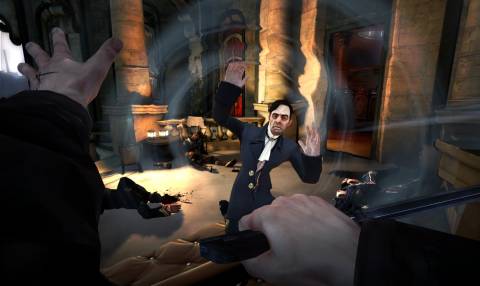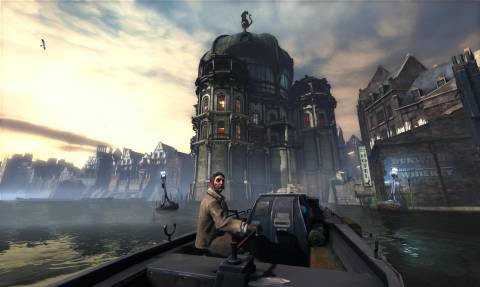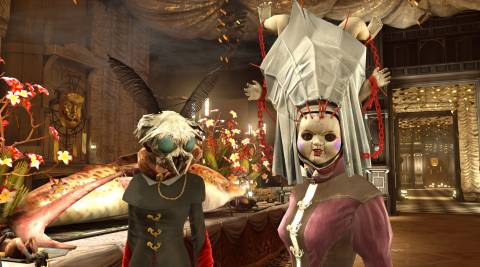
Countless creators have chased the phantoms of Deus Ex since its release in 2000, and most fail. That includes Deus Ex and Dishonored co-designer Harvey Smith, who himself stumbled with Deus Ex: Invisible War. Smith still doggedly pursues this very specific type of experience, long after Warren Spector paired up with a mouse. Dishonored is not the groundbreaking achievement Deus Ex was, but that would be asking too much. It is, however, a meaningful and successful reinvention of the core ideas behind Deus Ex with a singular focus on making this dense style of game more accessible.
You need a reason for the killing, and Dishonored wastes little time giving a reason to be vengeful. Corvo Attano’s primary task in life is protecting the Empress of Dunwall, a trade city (imagine a steampunk City 17) wrecked by an awful plague transferred by an ever-growing population of rats. Corvo was sent abroad to seek help from the nearby lands, only to return with word that Dunwall will soon be locked away to rot. It is dire times for Dunwall, and the city is ripe for revolution. Magical assassins appear, kill the Empress, and kidnap her daughter and successor to the throne, Emily. You’re framed for the murder, and are sent to prison. Corvo is eventually freed by a group called The Loyalists, Dunwall insiders who know the truth. If he helps take down the tyrannical leader now ruling Dunwall, they will clear his name. And so establishes the general structure of Dishonored. The Loyalists are holed up at a tiny pub in Dunwall, which acts as a moment to catch your breath between missions, learn about the next target, purchase upgrades, and interact with the various characters.
Though presented in the first-person, this style of game has never really been about shooting. It’s always been about expansive player agency by way of interacting with a complex series of layered AI systems, and manipulating that with your toolset. This approach makes for an experience where every player comes away with a different story, and crystalized the idea of emergent gameplay before that became a buzz word. The lack of mechanical proficiency has been a problem, though, a stumbling block for anyone who wasn’t around for the Deus Ex zeitgeist, and can’t understand tolerating a game where one of the player’s primary abilities just isn’t very fun. Dishonored addresses this, from top to bottom. Everything about the combat feels good, from basic shooting to swordfights. An easy-to-use counterattack system makes it effortless to take on five or six enemies at once, and feel in complete control. Besides making Dishonored a more competent, accessible game, it simultaneously solves another design issue found in both this and more stealth-focused games like Metal Gear Solid. Getting caught no longer means you’re immediately reaching for the quick load button, and can instead choose to tackle the enemies with your array of combat options, or quickly skitter away with a little dose of magic.

Corvo is one of the few chosen by a mysterious force known as The Outsider, a supernatural being who exists both in and outside of reality, and has the ability to imbue people with a special mark. This mark gives them access to a range of special powers, and these help Dishonored break from its Deus Ex lineage, and establish its own identity. It’s not just Deus Ex set in a different city. Though it shares DNA, the few but vital powers Arkane Studios has created are revelatory. Blink, the first power, is also the most important one. Blink allows the player to instantly transport to wherever the reticule is pointed at, and if pointed at the top of a structure, it’ll even automatically climb it for you. Suddenly, the reason the buildings are so damn tall in Dishonored make sense. Blink means gameplay is no longer just horizontal but vertical, which exponentially multiplies your options in any given scenario. And blink is just the start. Other powers allow you to take control of people and animals, another one stops time and can eventually be used to have someone kill themselves with their own bullet. How? Pause time when the shot is fired, possess them, and place them in front of where you just were. Combined with a proper combat system, Dishonored encourages rampant experimentation.
Here’s just one example. Three guards line a river, each of them patrolling in different directions. Flip on dark vision to study their route, which creates vision cones for the enemies. You could take each of them out from a distance with your crossbow. You could possess the first one, have him commit suicide by jumping off a bridge, and sneak around the other two. You could stop time and just run right through them, and they won’t have enough time to react. You could summon a swarm of rats, which distracts them to another side of the map. You could rewire the nearby security system to attack everyone but you. You could possess a nearby fish, and swim underneath the river. The possibilities aren’t endless, but there are enough to make you feel right dizzy, and each is personally rewarding in different ways. You’ll want to invest in the base version of each power, unlocked by collecting runes in each level, just for variety’s sake. You can’t get everything your first time through the game, and you won’t want to. Eventually, you’ll settle into a rhythm, and find what works for you. I never invested runes into an ability that turned enemies to ash when killed because I was always avoiding killing anyone.
It’s important players are able to tell their own gameplay story in Dishonored, since the story the game is trying to tell isn’t great. Every beat is predictable, twists and all, and the few noteworthy mysteries, like the Outsider, are never satisfyingly explained. In retrospect, Deus Ex’s story was pretty silly, too, but it worked at the time. Standards have changed. Much of what you will learn about the broader world comes from books scattered about, but not every book is unique. The passages begin repeating pretty quickly, which meant I usually stopped trying to find them at all. There are similar storytelling missteps throughout Dishonored. Graffiti repeats ad nauseum, as does idle dialogue. The line “think you’ll get your own squad after what happened last night?” comes up again and again, and does a terrific job of breaking any sense of immersion. For a world otherwise superbly realized, these moments prompted me to tune out. Some characters show promise, but besides Pendleton, whose brothers are part of one of the better missions, none are woven into story enough to be memorable. And I can’t tell if it’s a good thing I didn’t realize Susan Sarandon voiced one of the characters or not. While the voice acting isn’t bad, the celebrities didn't seem necessary. I suppose the story disappointment wouldn’t sting so much if it didn’t come hand-in-hand with the climax playing out poorly as gameplay, too. For a game full of memorable missions, the final outing, where skills honed over the previous 10-to-15 hours should be pushed to the max, is mostly boring. Dishonored also commits the frustrating storytelling sin of ending out of nowhere and without enough resolution.

Fortunately, what comes before is so, so good. Each mission has a pretty similar setup, with players being dropped off outside of a new location by boat, and asked to eliminate one or more targets. How you choose to do that is completely up to you. Stabbing them in the back is an old standby, but there far more creative ways to take care of your enemies in Dishonored. Why not possess them and toss them off a balcony? Maybe think about turning on a nearby steamer and burning them alive? If you’re patient, too, there is always an option that won’t require killing them. It usually requires coming across a document in the world or overhearing a specific line of dialogue, but it comes with a worthwhile payoff. The Pendleton brothers, for example, can be kidnapped, stripped of their tongues, and sent to work in their own underground mines, unable to tell anyone how they’ve been wronged. Deliciously evil, right? I won’t spoil the others; discovery is half the fun. And do yourself a favor and don’t watch any of the mission walkthrough videos that are floating around the Internet. Some of them spoil terrific moments best experienced yourself. But, yes, the mission set in a masked party is as good as it looks and sounds, and the sheer variety of ways to complete it will prompt you to load it over and over again. Interesting mission setups, constantly changing locations, and always diverse moment-to-moment interactions with the game’s enemies is Dishonored’s killer combination.
It’s a good thing, too, since Dishonored is an excellent game, and one worthy of your attention. Dishonored’s greatest contribution to the genre games like Deus Ex helped establish will be best appreciated by those who’ve been with it from the start, but Arkane has made a game rooted in manipulating artificial intelligence that plays just as well to the guy or gal who wants to shoot stuff. That’s impressive.